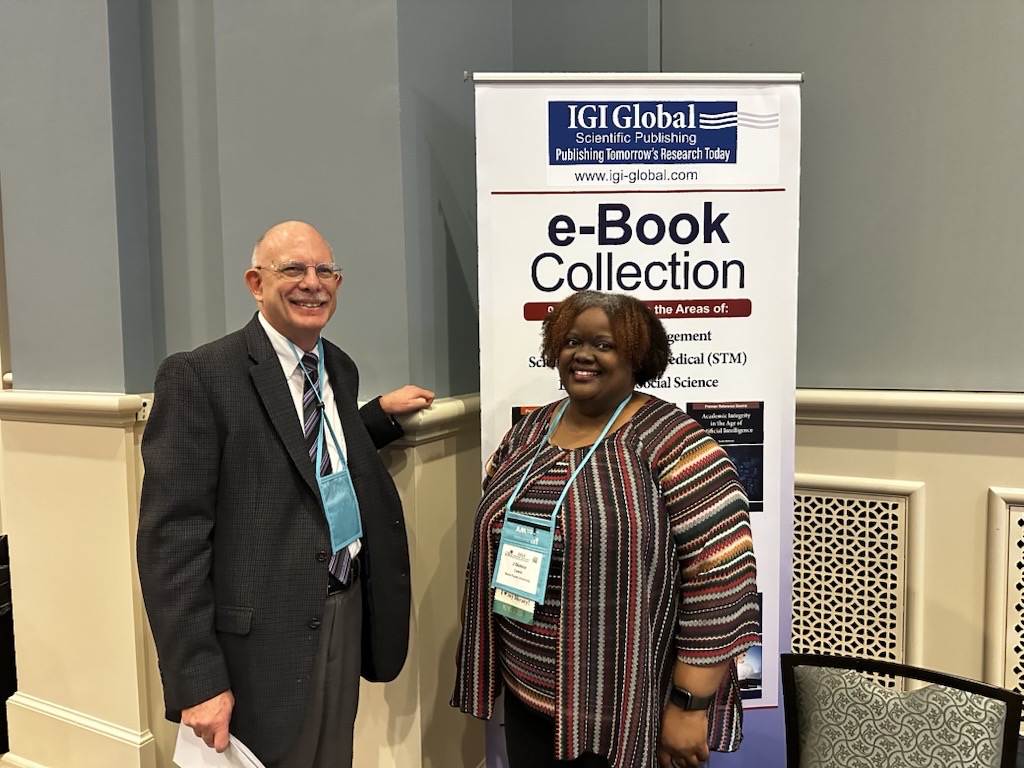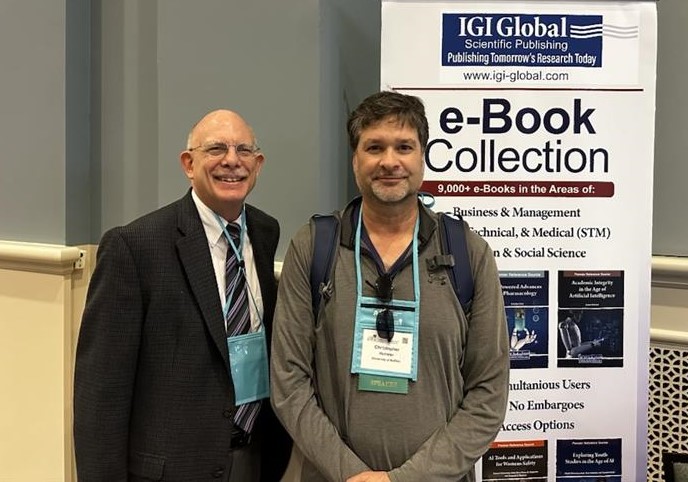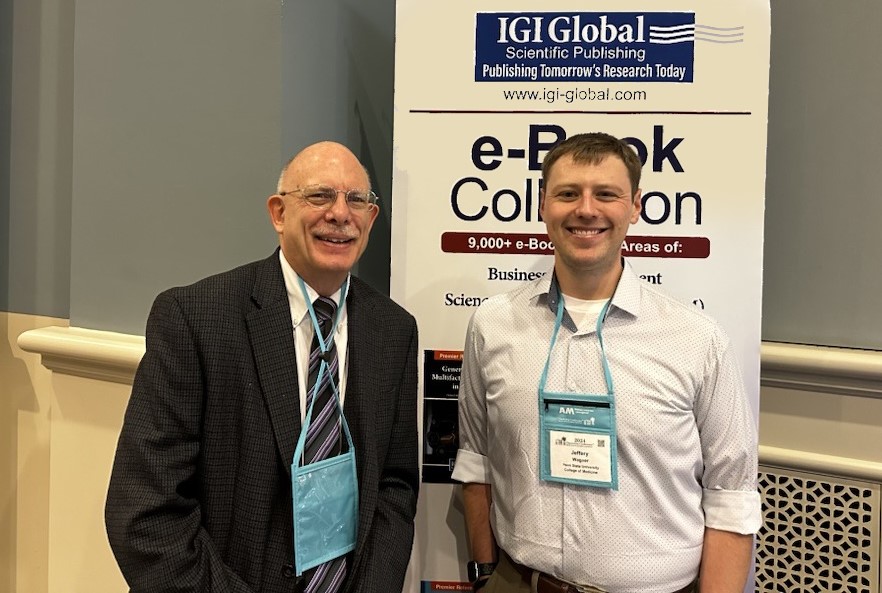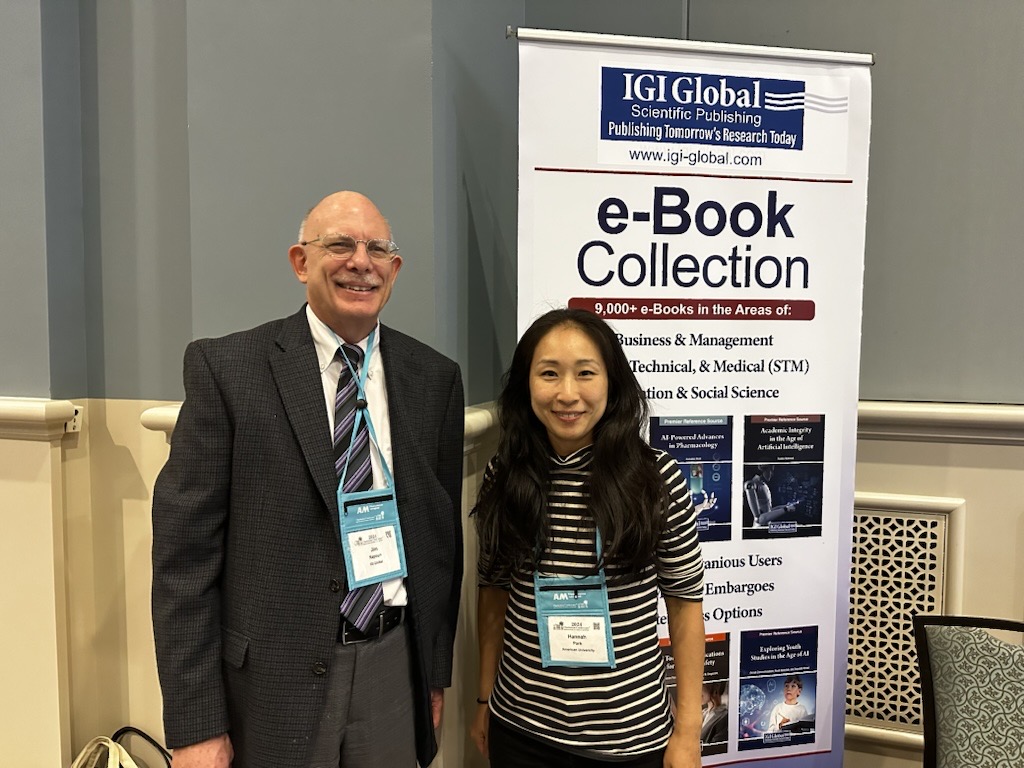The scholarship initiative aligns with the IGI Global Scientific Publishing mission to foster global collaboration and provide innovative resources that advance research and learning. The company extends its gratitude to all applicants and looks forward to continuing its support for the library community in the years to come.
Read the Winning Responses BelowWhat are the implications of using AI tools for academic research and scholarly publications, and how will this impact library support for the research efforts of faculty, students, and staff?
J. Denice Lewis, Research and Instruction Librarian for Engineering and Science at Wake Forest University:

Currently, AI tools impact every step of the scientific method from determining research topics to identifying journals for publishing. However, academia's slow adoption rate and the persistence of paywalled resources limit AI's full potential. In addition, despite students being digital natives, many lack digital information literacy skills. In this evolving landscape, librarians remain crucial in:
- Assisting with resource access and research support
- Developing enhanced digital literacy programs
- Providing guidance on ethical AI use in academia
- Navigating copyright and licensing issues with utilizing specific AI tools
- Ensuring research reproducibility and preservation
- Collaborating with faculty on AI integration in various disciplines
- Upskilling to maintain relevance in an AI-enhanced research environment.
Libraries must adapt their services and staff expertise to effectively support AI-assisted academic research while addressing the associated challenges and continuous evolution of AI tools.
What are the implications of using AI tools for academic research and scholarly publications, and how will this impact library support for the research efforts of faculty, students, and staff?
Christopher Hollister, Head of Scholarly Communication at the University at Buffalo:

As co-founder and co-editor of the open access journal, Communications in Information literacy (CIL), I am on the frontline in terms of addressing this two-part question. The implications of using AI tools for academic research and scholarly publications are significant. At CIL, we are already seeing the benefits or using AI tools to form research questions, find relevant literature, analyze data, generate images, and improve the overall readability of submitted manuscripts. On the other hand, we are also experiencing an uptick in submissions that are fully generated by AI tools.
Accordingly, we developed the following policy:
“Authorship and AI Tools
CIL's editors acknowledge the rapid development of artificial intelligence (AI) and its evolving roles in our lives. This generative AI policy is therefore subject to change.
Authorship is a distinctly human endeavor. As such, authors may not list an AI tool as a co-author. Authors who use these tools to assist with aspects of their research such as content creation, data analysis, image creation, or organizing results are required to describe their processes and list the AI tool used in the methods section of their manuscript. Authors who use AI technology to discover source materials are responsible for verifying and citing those materials as usual. Authors who use AI tools to improve grammar, syntax, style, and overall readability should include a note detailing such use in the cover letter when submitting a manuscript; authors do not need to disclose such detail in the methods section.”
-Communications in Information Literacy Author Guidelines
We are also seeing evidence that some of CIL's reviewers may be using AI tools to generate manuscript evaluations, and we are presently developing new guidelines to address that challenge. My experience with AI tools in my editorial role with CIL has a direct bearing on library support for the research efforts of our faculty, students, and staff. My daily responsibilities as Head of Scholarly Communication involves working with these constituencies to advance the research and publishing activities. Accordingly, I consult with individuals, meet with departmental faculty, and lead relevant workshops about emerging AI tools and the ethical use of AI in research and publishing. This is a spectacularly exciting time to be involved in scholarly communication.
With the library one of the few trusted, reliable guides to credible information, how will the role of librarians adapt to combat the misinformation hazards, biases, and other pitfalls of AI systems?
Jeffery Wagner, Collection Development & Digital Resource Management Librarian at Harrell Health Sciences Library Penn State College of Medicine:

Librarians have been teaching information literacy skills for decades and continue to adapt and embrace changes that impact the information landscape within which they lead others through. Since the launch of OpenAI's Chat GPT in November of 2022, librarians have collaborated and created numerous ways of integrating information literacy instruction while embracing the use of generative AI.
One such example within my workplace is the creation of an assignment for our first-year medical students related to "searching PubMed like a pro" and utilizing Chat GPT to compare search results for citations as well as created search strings by Chat GPT. Another event a librarian and I offered related to freely accessible generative AI tools involved demoing three tools, those being Microsoft Copilot, Chat GPT, and Goblin Tools. We provided a brief overview and history of each AI tool and explained their benefits and limitations as it relates to their integration into one's everyday workflow to increase productivity and save time. It's important to note that with both these activities, it shows that librarians continue to embrace change and create opportunities that showcase all aspects, good and bad, with life's advancements. This is why librarians continue to succeed, even excel in what they do as stewards of information and the sharing of the finer details in life's processes and pathways to success and happiness for those who seek the help of librarians.

With the library one of the few trusted, reliable guides to credible information, how will the role of librarians adapt to combat the misinformation hazards, biases, and other pitfalls of AI systems?
Hannah Park, Education Librarian at American University Library:

As AI systems become more prevalent, librarians will be needed more than ever. We have always been curators, evaluators, and guides to information, helping users navigate evolving information ecosystems. Our role in helping to develop critical evaluation skills as well as digital and information literacy skills in our users will become even more pronounced. Librarians will need to help users understand how AI systems work, the biases and limitations of these systems, as well as how best to use them, bringing a critical and evaluative stance to the content an AI system generates.
Librarians can also advocate for more transparent and ethical practices by working with AI developers. Librarians will continue to work with their community, giving workshops and classes, creating guides, and helping users to navigate this evolving information landscape. They will be critical partners in helping to combat misinformation, biases, and other stumbling blocks of AI.
About the Winning Librarians
J. Denice Lewis is the Research and Instruction Librarian for Engineering and Science at Wake Forest University in Winston-Salem, North Carolina. She was awarded the ZSR Faculty of the Year award in 2022. She won the Early Career Award from the American Society of Engineering Education, Engineering Libraries Division. At the 2024 Charleston Conference, she gave a presentation on "AI's Role in Research: Perspectives from Researchers and Librarians."
Jeffery Wagner is the Collection Development & Digital Resource Management Librarian at the Harrell Health Sciences Library Penn State College of Medicine in Hershey, Pennsylvania. He serves a the library liaison for comparative medicine, dermatology, humanities, cardiology, nutrition, pathology, several types of surgery, and urology. He is a member of the Medical Library Association, and the Pennsylvania Library Association.
Hannah Park is the Education Librarian at the American University Library in Washington, DC. She was the principal investigator of a grant that was awarded by the American Library Association's Carnegie-Whitney Grant to create an Antiracist Praxis research guide. It is currently the most used guide at American University Library and was even cited in a Washington Post Magazine article. She is also a member of the 2024 Caldecott Award Selection Committee, which annually awards the most distinguished American picture book published in the preceding year.
Christopher Hollister is the Head of Scholarly Communication at the University at Buffalo in Cheektowaga, New York. He is the co-founder and co-editor for the open access journal, Communications in Information Literacy (CIL), an ACRL award-winning, no-fee open access journal devoted to advancing information literacy research and scholarship in higher education. The journal is community owned and operated, and it is in eighteenth year of publication.
Browse for more posts in:
Awards & RecognitionPress ReleaseLibrary and Information ScienceArtificial IntelligenceLibrary Information SystemsConferencesResources for LibrariansCharleston